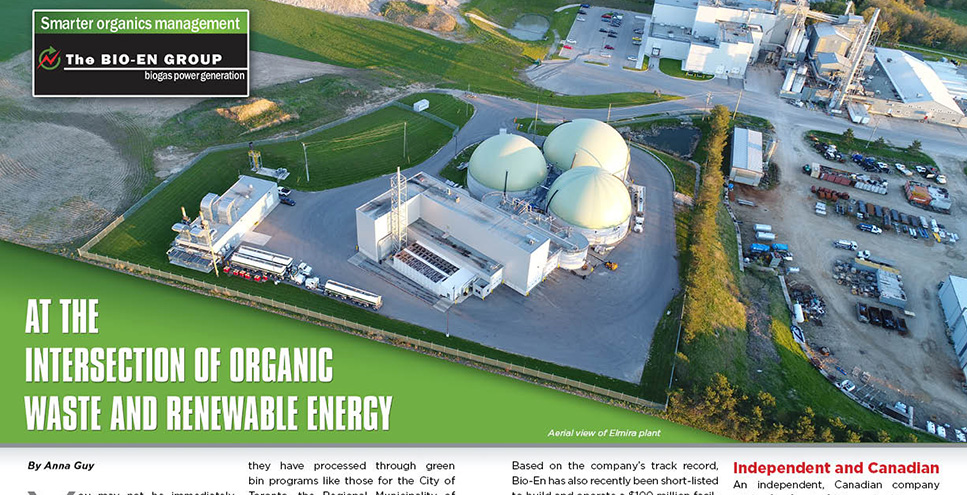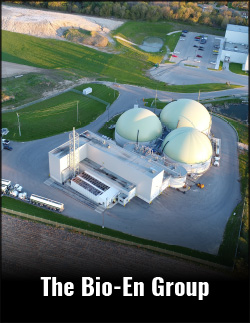At the intersection of organic waste and renewable energy
By Anna Guy
You may not be immediately familiar with the name Bio-En Power, but chances are you’ve contributed to the hundreds of thousands of tonnes of organic waste they have processed through green bin programs like those for the City of Toronto, the Regional Municipality of York, and the Region of Peel. That also means you’ve likely used renewable electricity they have generated from that organic waste.
Based on the company’s track record, Bio-En has also recently been short-listed to build and operate a $100 million facility for the Regional Municipality of Peel (1.6 million people, immediately west of the City of Toronto) to process its green bin organic wastes.
Independent and Canadian
An independent, Canadian company at the forefront of biogas in this country, Bio-En Power designs, builds, owns, and operates large-scale biogas facilities that convert a broad range of organic waste materials into 100 per cent green, renewable energy and an organic, agricultural fertilizer.
Bio-En’s facility in Elmira, Ontario, where much of their organic waste processing is done, is one of three large facilities of this type in Ontario built by Bio-En (they own the Elmira plant, and built the other two) as well as a fourth in Nicaragua.
“Bio-En Power’s specialty lies at the intersection between large sources of organic waste and an interest in producing renewable energy,” says Paul Taylor, Manager of New Business Development.
Not only are municipalities and companies interested in biogas for the financial benefits, biogas plants are good news for carbon-reduction targets as well.
An independent consultant, retained by Bio-En to review the contribution made by Bio-En plants, found that to the end of 2018, its plants had reduced worldwide greenhouse gas emissions by 30,000 tonnes of CO2-equivalent. “That’s equal to reducing the number of kilometers driven by the world’s automobile fleet by of 120 million kilometers,” says Taylor, who is also Co-Chair of the Canadian Biogas Association. “Those are big numbers.”
Integration and Experience
What puts Bio-En in a leadership position in Biogas? In short, a unique combination of in-house technology development, unparalleled operational knowledge, seamless integration and, the clincher, its own 70,000-tonne R&D facility adjacent to its Elmira offices.
“It’s one of the largest facilities of its type in Canada, but we use it on an ongoing basis to test and hone our ideas and practices so as to deepen our experience and abilities. We don’t know of anyone else in our industry that can offer this depth of integration and experience.”
“Once we take on any project, we will stay with it for the rest of its lifetime,” explains Taylor, “and ensure that the owners and operators continue to have whatever support they need, to make sure that it continues to be a credit to them (and to us), for as long as the plant is to run.”
Fuel your Business
Bio-En’s most recent project in Nicaragua illustrates the capabilities of the team especially well. Bio-En was approached by a major, local beef processor who operated their own feedlot for their animals, as well as their own related slaughterhouse and tannery. Consequently, they had a lot of organic wastes (a disposal liability) and they consumed large amounts of electricity and boiler fuel every year in their operations.
Bio-En undertook a feasibility study for the processor to examine the volume and nature of the wastes they produced and the energy needs of their facility, and to develop a preliminary outline of the facility that they would need to make it work. Secure in Bio-En’s technical ability, and buoyed by the feasibility study’s data, the processor signed a contract for Bio-En to design and build a plant on their site.
“Construction took just under one year, and the plant was commissioned by our staff working alongside their own engineer on site,” says Taylor. “The new plant worked essentially as we had said it would, and began producing electricity and boiler gas for their business. They were happy.”
Happy enough that, less than a year later, the processor asked Bio-En to double the size of the original facility. The lower energy and waste management cost structure that their biogas plant created allowed them to further expand their business more rapidly than they had originally planned to do.
This expansion had enabled the processor to generate 90 per cent of the electricity and 100 per cent of the boiler fuel required to operate their energy-intensive business using their own waste materials. And to complete the circle, “After processing through our plant, those wastes were converted into a valuable fertilizer that the company is now using on their own crop lands,” says Taylor.
Tremendous Potential
“There’s tremendous potential” for biogas in Canada, say Taylor. “Our industry is a great solution for governments who wish to see more organic waste diverted away from disposal, and put to better use. Most senior-level governments across Canada are pursuing agendas of that type. At the same time, biogas plants make 100 per cent renewable energy from those wastes, typically in the form of either electricity or natural gas.”
R&D
Bio-En’s technology is sourced world-wide to construct the best system for each client’s unique needs, while allowing for the flexibility to maintain absolute state-of-the-art offerings. “We’re very happy with the system we are running at our R&D plant today, but don’t expect it to be the same five years from now,” explains Taylor. “This is a rapidly evolving sector, and our approach will continue to allow us to select and blend in the very best new ideas from a range of technology vendors from around the world. There are always new and better ideas.”
For example, Bio-En has focused a great deal of time and energy on processing organic waste with more contaminants (think plastic wraps, bottle caps) better than anyone in the industry. “We are routinely processing organic feedstocks that come mixed with 25 per cent inorganic contaminants and more,” says Taylor. “And we use them to produce a super-clean fertilizer that is approved for use on Certified Organic farms in Canada. We believe that our ability to process organic wastes that are heavily-contaminated with those kinds of packaging and other inorganics, and to produce from that a super-clean product that is approved for use in Certified Organic farming, is unmatched in North America.”
Bio-En is positioned to continue its leading position in Canadian biogas. Its Elmira facility will operate under its ownership for years to come and, with a number of such projects in the pipeline, Bio-En looks forward to continuing to roll those out, both as a vendor and as an owner/operator. As the biogas industry continues to grow in Canada, watch for Bio-En to lead the way.







